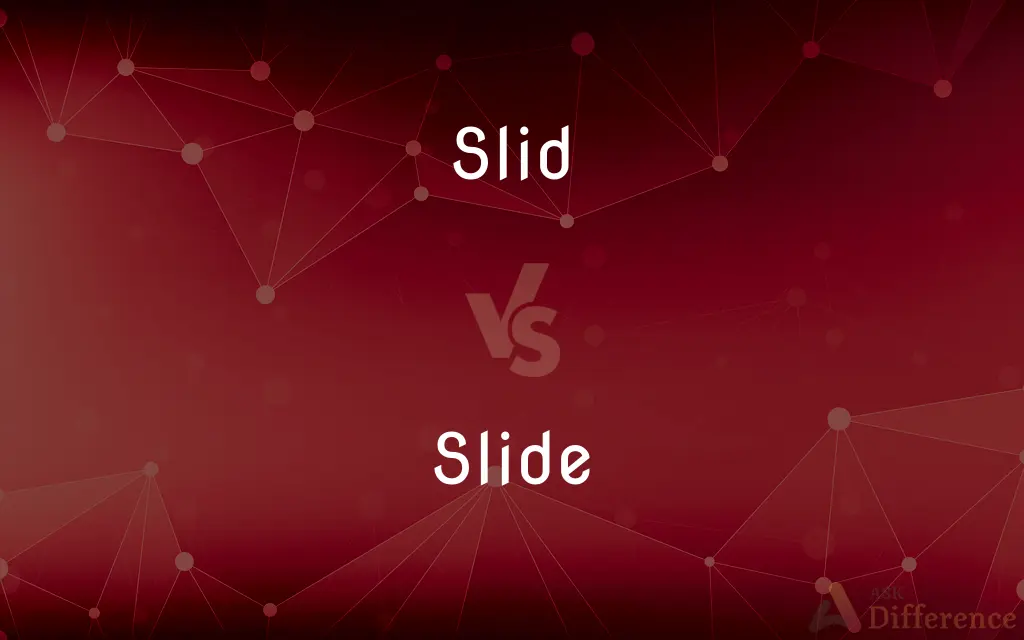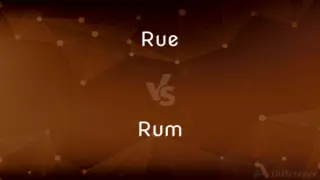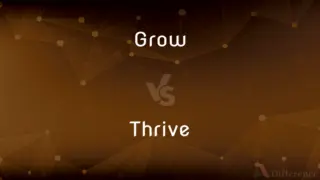Slid vs. Slide — What's the Difference?
By Maham Liaqat & Urooj Arif — Updated on April 2, 2024
Slid is the past tense of slide, indicating a past action of moving smoothly along a surface. Slide is the base form, used for current or general actions of moving or making something move smoothly.

Difference Between Slid and Slide
Table of Contents
ADVERTISEMENT
Key Differences
Slid refers to an action already completed, where an object or person moved smoothly over a surface, typically with continuous contact. For example, the ice skater slid across the ice gracefully. Whereas, slide is used to describe the action of moving smoothly along a surface, often with ease and ongoing motion, like when someone says, "Be careful not to slide on the wet floor."
While slid indicates a specific moment in the past, slide encompasses a broader range of tenses through its various forms (slides, sliding, slid), allowing it to describe actions that are happening now, in the future, or in a habitual sense. For instance, we might say, "Children love to slide down the hill on a sled," showcasing slide in a present or general context.
Slide also functions as a noun, describing an object or device that allows something to move smoothly over a surface or an image projected onto a screen. In contrast, slid strictly functions as the past tense verb form, lacking a noun usage.
In technical or specialized contexts, such as presentations or photography, slide refers specifically to a single image or page in a presentation or a small piece of film for viewing images through a projector. Whereas slid has no application in this noun context, strictly referring to the action described in its past tense form.
Slide can also imply a gradual, often unnoticed change from one state to another, such as "The project began to slide off schedule." Slid, capturing the action after it has occurred, might recount a similar shift but emphasizes that the change has already happened, as in "The project slid off schedule."
ADVERTISEMENT
Comparison Chart
Part of Speech
Verb (Past tense)
Verb (Base form) / Noun
Usage
Indicates completed action of moving smoothly
Describes the act of moving smoothly; also refers to objects/devices for sliding, or images in presentations
Tense
Past
Present, Future, General (depends on context)
Noun Function
None
Yes (e.g., playground equipment, a page in a presentation)
Context of Use
Recounting past events
Describing ongoing, future actions or states; also used in specialized contexts like photography or presentations
Compare with Definitions
Slid
Moved smoothly along a surface, typically with continuous contact.
She slid the note across the table to him.
Slide
A single page or image in a presentation.
The next slide shows our quarterly earnings.
Slid
Went into a worse state, usually gradually and unnoticed.
The team's performance slid as the season progressed.
Slide
To move smoothly along a surface, maintaining continuous contact.
The child loves to slide down the snowy hill.
Slid
Slipped out of the proper position.
The book slid off the shelf during the earthquake.
Slide
To move or cause to move smoothly and easily.
He expertly slid the glass doors open.
Slid
Used in various phrases to indicate moving into a situation or condition.
She slid into debt after losing her job.
Slide
A playground equipment on which children slide down.
The park's new slide is a hit with the kids.
Slid
Moved quietly or stealthily.
He slid into the room hoping no one would notice.
Slide
To move into a worse condition.
The discussion quickly slid into an argument.
Slid
Past tense and past participle of slide.
Slide
To move over a surface while maintaining smooth continuous contact.
Slid
Simple past tense and past participle of slide
Slide
To participate in a sport that involves such movement
Sliding for a medal in luge.
Slide
To lose a secure footing or positioning; slip
Slid on the ice and fell.
Slide
To pass smoothly and quietly; glide
Slid past the door without anyone noticing.
Slide
(Baseball) To drop down from a running into a lying or diving position when approaching a base so as to avoid being tagged out.
Slide
To be ignored or not dealt with; drop
Let the matter slide.
Slide
To decrease
Prices slid in morning trading.
Slide
To become less favorable or less desirable
Economic conditions have begun to slide.
Slide
To cause to slide or slip
Slid the glass down to the other end of the counter.
Slide
To place covertly or deftly
Slid the stolen merchandise into his pocket.
Slide
A sliding movement or action.
Slide
A smooth, usually inclined surface or track for sliding
A water slide.
Slide
A playground apparatus for children to slide on, typically consisting of a smooth chute climbed onto by means of a ladder.
Slide
A part that operates by sliding, as the U-shaped section of tube on a trombone that is moved to change the pitch.
Slide
A period of decline or loss
"The semiconductor industry is heading for a cyclical slide" (New York Times).
Slide
An image on a transparent base for projection on a screen.
Slide
One of a series of images projected digitally as part of a presentation.
Slide
A small glass plate for mounting specimens to be examined under a microscope.
Slide
A fall of a mass of rock, earth, or snow down a slope; an avalanche or landslide.
Slide
A backless shoe with an open toe.
Slide
A slight portamento used in violin playing, passing quickly from one note to another.
Slide
An ornamentation consisting of two grace notes approaching the main note.
Slide
A small metal or glass tube worn over a finger or held in the hand, used in playing bottleneck-style guitar.
Slide
The bottleneck style of guitar playing.
Slide
(ergative) To (cause to) move in continuous contact with a surface.
He slid the boat across the grass.
The safe slid slowly.
Snow slides down the side of a mountain.
Slide
(intransitive) To move on a low-friction surface.
The car slid on the ice.
Slide
To drop down and skid into a base.
Jones slid into second.
Slide
(intransitive) To lose one’s balance on a slippery surface.
He slid while going around the corner.
Slide
(transitive) To pass or put imperceptibly; to slip.
To alter the meaning of a question by sliding in a word
Schoolchildren sometimes slide each other notes during class.
Slide
(transitive) To subtly direct a facial expression at (someone).
He slid me a dirty look.
Slide
To pass inadvertently.
Slide
(intransitive) To pass along smoothly or unobservedly; to move gently onward without friction or hindrance.
A ship or boat slides through the water.
Slide
To decrease in amount or value.
The stock market slid yesterday after major stocks released weak quarterly results.
Slide
(music) To smoothly pass from one note to another by bending the pitch upwards or downwards.
Slide
(regional) To ride down snowy hills upon a toboggan or similar object for recreation.
Slide
To go; to move from one place or to another.
Slide
(soccer) To kick so that the ball slides along the ground with little or no turning.
Slide
An item of play equipment that children can climb up and then slide down again.
The long, red slide was great fun for the kids.
Slide
A surface of ice, snow, butter, etc. on which someone can slide for amusement or as a practical joke.
Slide
The falling of large amounts of rubble, earth and stones down the slope of a hill or mountain; avalanche.
The slide closed the highway.
Slide
An inclined plane on which heavy bodies slide by the force of gravity, especially one constructed on a mountainside for conveying logs by sliding them down.
Slide
A mechanism consisting of a part which slides on or against a guide.
Slide
The act of sliding; smooth, even passage or progress.
A slide on the ice
Slide
A lever that can be moved in two directions.
Slide
A valve that works by sliding, such as in a trombone.
Slide
(photography) A transparent plate bearing an image to be projected to a screen.
Slide
A page of a computer presentation package such as PowerPoint.
I still need to prepare some slides for my presentation tomorrow.
Slide
(sciences) A flat, usually rectangular piece of glass or similar material on which a prepared sample may be viewed through a microscope Generally referred to as a microscope slide.
Slide
(baseball) The act of dropping down and skidding into a base
Slide
A hand-held device made of smooth, hard material, used in the practice of slide guitar.
Slide
A lively dance from County Kerry, in 12/8 time.
Slide
(geology) A small dislocation in beds of rock along a line of fissure.
Slide
(music) A grace consisting of two or more small notes moving by conjoint degrees, and leading to a principal note either above or below.
Slide
(phonetics) A sound which, by a gradual change in the position of the vocal organs, passes imperceptibly into another sound.
Slide
A clasp or brooch for a belt, etc.
Slide
A pocket in one's pants (trousers).
With ten dollars in his slide
Slide
(footwear) A shoe that is backless and open-toed.
Slide
(speech therapy) A voluntary stutter used as a technique to control stuttering in one's speech.
Slide
A promiscuous woman, slut.
Slide
To move along the surface of any body by slipping, or without walking or rolling; to slip; to glide; as, snow slides down the mountain's side.
Slide
Especially, to move over snow or ice with a smooth, uninterrupted motion, as on a sled moving by the force of gravity, or on the feet.
They bathe in summer, and in winter slide.
Slide
To pass inadvertently.
Beware thou slide not by it.
Slide
To pass along smoothly or unobservedly; to move gently onward without friction or hindrance; as, a ship or boat slides through the water.
Ages shall slide away without perceiving.
Parts answering parts shall slide into a whole.
Slide
To slip when walking or standing; to fall.
Their foot shall slide in due time.
Slide
To pass from one note to another with no perceptible cassation of sound.
Slide
To pass out of one's thought as not being of any consequence.
With good hope let he sorrow slide.
With a calm carelessness letting everything slide.
Slide
To cause to slide; to thrust along; as, to slide one piece of timber along another.
Slide
To pass or put imperceptibly; to slip; as, to slide in a word to vary the sense of a question.
Slide
The act of sliding; as, a slide on the ice.
Slide
Smooth, even passage or progress.
A better slide into their business.
Slide
That on which anything moves by sliding.
Slide
That which operates by sliding.
Slide
A plate or slip of glass on which is a picture or delineation to be exhibited by means of a magic lantern, stereopticon, or the like; a plate on which is an object to be examined with a microscope.
Slide
The descent of a mass of earth, rock, or snow down a hill or mountain side; as, a land slide, or a snow slide; also, the track of bare rock left by a land slide.
Slide
A small dislocation in beds of rock along a line of fissure.
Slide
A grace consisting of two or more small notes moving by conjoint degrees, and leading to a principal note either above or below.
Slide
A sound which, by a gradual change in the position of the vocal organs, passes imperceptibly into another sound.
Slide
Same as Guide bar, under Guide.
Slide
A small flat rectangular piece of glass on which specimens can be mounted for microscopic study
Slide
(geology) the descent of a large mass of earth or rocks or snow etc.
Slide
(music) rapid sliding up or down the musical scale;
The violinist was indulgent with his swoops and slides
Slide
Plaything consisting of a sloping chute down which children can slide
Slide
The act of moving smoothly along a surface while remaining in contact with it;
His slide didn't stop until the bottom of the hill
The children lined up for a coast down the snowy slope
Slide
A transparency mounted in a frame; viewed with a slide projector
Slide
Sloping channel through which things can descend
Slide
Move obliquely or sideways, usually in an uncontrolled manner;
The wheels skidded against the sidewalk
Slide
To pass or move unobtrusively or smoothly;
They slid through the wicket in the big gate
Slide
Move smoothly along a surface;
He slid the money over to the other gambler
Common Curiosities
How do slid and slide differ in usage?
Slid is used for past actions, while slide is versatile, applying to actions in any tense and serving as a noun in specific contexts.
Can slide indicate a gradual change?
Yes, slide can imply a gradual, often unnoticed change from one state to another.
Do slid and slide have different meanings?
Their core meaning revolves around smooth movement, but slide also has noun uses, which slid does not.
When should I use slid in a sentence?
Use slid when referring to an action of moving smoothly that has already happened.
When is it appropriate to use slide?
Slide is appropriate when talking about current or future actions of moving smoothly or when referring to objects related to such movements.
Can both slid and slide indicate stealthy movement?
Yes, both can be used to describe moving quietly or stealthily, but slid indicates that this action has already occurred.
What is the difference between slid and slide?
Slid is the past tense of slide, indicating a completed action of moving smoothly. Slide is the base form, referring to the action itself or objects that enable this movement.
Is slid ever used as a noun?
No, slid is solely used as the past tense of the verb slide and does not function as a noun.
Can slide be used as a noun?
Yes, slide can be a noun, describing objects or devices that allow smooth movement or images in presentations.
How do the grammatical roles of slid and slide differ?
Slid functions solely as a past tense verb, while slide serves both as a verb in various tenses and as a noun.
Are there contexts where slid and slide are interchangeable?
No, due to their tense differences, they are not interchangeable; slid is always past tense, while slide can be present, future, or a noun.
How does the use of slid and slide differ in technical contexts?
Slide can refer to specialized objects or presentation images, whereas slid is limited to describing past movement actions.
Can slide be used to describe a deterioration in state?
Yes, slide can describe a gradual shift into a worse state.
Is there a scenario where slid could be used instead of slide?
Only when recounting past events where the action of sliding has already occurred.
What are common mistakes when using slid and slide?
A common mistake is using slid (past tense) when the action is ongoing or vice versa.
Share Your Discovery

Previous Comparison
Rue vs. Rum
Next Comparison
Grow vs. ThriveAuthor Spotlight
Written by
Maham LiaqatCo-written by
Urooj ArifUrooj is a skilled content writer at Ask Difference, known for her exceptional ability to simplify complex topics into engaging and informative content. With a passion for research and a flair for clear, concise writing, she consistently delivers articles that resonate with our diverse audience.















































